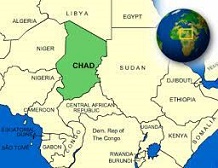United States Marine Corps General Michael Langley, Commander, U.S. Africa Command, and Sergeant Major Michael Woods visited Chad on January 9-10, 2024, to discuss security collaboration with Chadian military leaders.
During the visit, Langley had the opportunity to congratulate the nation’s first female military pilots trained on the C-208 light reconnaissance aircraft. Langley and Woods engaged with key military leaders and partners to discuss collaborative efforts in promoting peace, security, and stability across the Sahel.
“U.S. Africa Command remains dedicated to building enduring partnerships with Chad and other African nations in the Sahel to address mutual security concerns and to help promote a peaceful and prosperous future in the region,” Langley said.
During the trip, Langley met with General Abakar Abdelkerim Daoud, Chief of Staff for the Armed Forces for Chad, and other military leaders. Discussions focused on regional security challenges and Chadian efforts to counter violent extremism in the Sahel.
Langley also viewed the Chadian Air Force’s two C-208B light reconnaissance aircraft and took the opportunity to speak with pilots, maintainers, and operators. The aircraft were formally handed over by the United States in 2018. Chadian forces use the aircraft for intelligence, surveillance, and reconnaissance missions to counter violent extremist organizations in the Lake Chad Basin.
Of note, Langley met with Chad’s first two female military pilots, Lt. Ahmat and Lt. Djiddi from the Chadian Air Force who were certified to fly the C-208s in the United States in 2022.
Instability in the Sahel threatens U.S. interests, making collaboration essential for intelligence sharing and capacity building. Additionally, U.S. engagement aids regional stability, essential for economic growth and humanitarian efforts. By fostering partnerships, the United States aims to counter terrorism and promote collective security efforts in the Sahel.
The Sahel region in Africa holds immense security importance due to its challenges. Extremist groups exploit weak governance and environmental stressors, causing instability. This insecurity not only affects the Sahel but also poses a global threat by fostering terrorism and exacerbating humanitarian crises.
In addition, Langley met with U.S. military personnel stationed at the embassy, recognizing members for their accomplishments.
“It was an honor to have General Langley with us, to see the progress Chad has made since his last visit here,” said U.S. Army Colonel Mark Choate, Senior Defense Official, Defense Attaché to the Republic of Chad. “On the military front, Chad has enacted important reforms, embracing civilian governance with a civilian Minister of Defense and maintaining its international commitments in a time of turmoil.”
U.S. Africa Command is one of seven U.S. Department of Defense geographic combatant commands. The command is responsible for all U.S. military operations, exercises, security cooperation, and conducts crisis response on the African continent to advance U.S. interests and promote regional security, stability, and prosperity.
The visit highlights U.S. Africa Command’s 3D approach, which leverages diplomacy, development, and defense collaboration.

